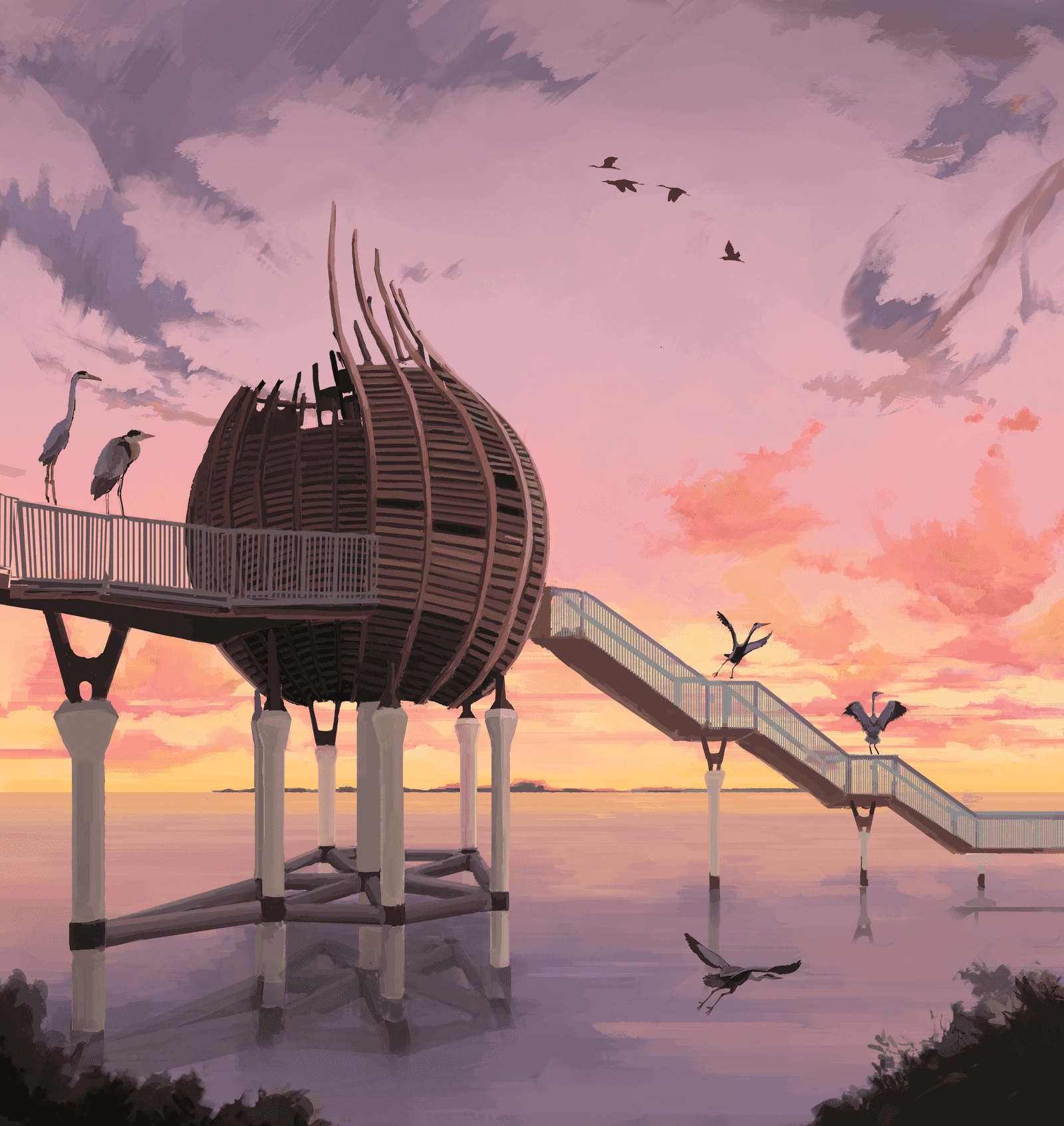
Grey Herons
Gold and crimson rays of light reached across the sky. A few faint hoots echoed out from the forest, but by and large the members of the nighttime service had begun their slumber. The light illuminated a wooden structure perched on a platform standing in the water. It was circular in shape, constructed out of curved wooden boards.
It would have been an excellent shelter for the Herons, had the ceiling been completed. As it stood, any inhabitants would frequently find themselves drenched by rain.
The structure has been under construction for some time. Plans for the Shelter had first been drawn up when some of the Herons were but hatchlings. Even at that time it had been clear that the growing Heron population would require more accommodation, but the Heron Decision-making Branch (which normally sat on that eponymous part of the tree) had been reluctant to commit resources in advance of demand. The Branch was concerned that the Shelter might not be necessary if the population did not grow as quickly as expected and unoccupied accommodation would be a waste of resources. Sub-optimal occupation of the Shelter might also disrupt the delicate pecking order within the Herons — the shelter would provide comfortable nesting spots to many, making existing highly-prized nesting spots less attractive. In any case, there was no need to put the chicken before the egg; the situation might right itself in time to come. The Branch therefore made arrangements for some lizard neighbours to keep a close eye on the availability of Heron accommodation.
Some years back, the lizards, who had since come to be known as Monitor Lizards (in light of their task), had reported to the Branch that accommodation availability was at an all-time low, and an accommodation crunch was to be expected in the near future. The omnivorous lizards also included in their report an offer to resolve the accommodation crunch with a munch or two, hoping for some lunch as payment for their work, but the Branch was unamused. Left with no other option, it finally commissioned the construction of the structure.
The Shelter project was a costly one, and much of the proceeds from the Herons' participation in the Generally Roaming Airborne Bird (GRAB) service had been diverted to paying for the construction. Recently though, the Herons' finances had become further stretched by some new fees they had to pay.
An enterprising colony of ants had put together a number of brightly-marked wooden platforms to make passenger pickups more convenient. The platforms functioned as designated pickup points and were angled with a gentle incline for ease of pickup and takeoff. The ant colony was large and well-organised, and weighed approximately a ton, hence was known as the Ant Ton. For the convenience of using the wooden platforms, the Ant Ton charged a small 'platform fee'. The fee had initially been nominal and the Ant Ton had provided other freebies such as food and drink for the busy Herons, but as passengers became used to and began to expect the convenience of using the wooden platforms, the Ant Ton saw less need to sweeten the deal. The platform fee therefore gradually increased and the freebies were withdrawn. Coupled with some unwise investments in Of late, the Herons therefore found themselves taking home barely enough to support themselves.
The construction of the Shelter had been carried out by the Gray Turf tribe, which was simultaneously involved in redevelopment projects in Dover Forest. Despite their increasingly tight financial situation, the Herons continued to make payments on time to Gray Turf, until construction abruptly stopped. For reasons unknown, Gray Turf had suddenly collapsed or vanished. No one could find any trace of any tribe members or tribe activity.
This was the final straw for some of the Herons who had been anxious over the growing accommodation problem for some time. They had petitioned the Branch repeatedly requesting for more accommodation sooner and in greater quantity, but the Branch had commissioned only this single Shelter project. Whilst the construction had proceeded at a glacial pace, the Herons had to squeeze on overcrowded trees and endure guano leaks from other occupants above. The estimated completion date for the Shelter had been repeatedly pushed back, and construction had now completely stalled. Enough was enough for these disgruntled Herons and they seceded from the greater flock, heading north towards greener pastures where it was rumoured that accommodation was 3.3 times easier to come by.